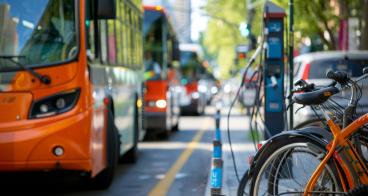The European AI market: towards ethical leadership
Artificial Intelligence has been coming on strong in Europe – despite remaining market-entry burdens, many high-quality solutions have been developed in Europe to support use cases in the urban mobility sector – in this Insight you will learn about some of them.
The European Union is one of the biggest innovators with regards to artificial intelligence applications. According to the report Artificial Intelligence: A European Perspective, in 2018, Europe was already home of 1600 early stage software companies offering AI-driven solutions; more than 25% of the world's leading AI research centres and companies are based in the EU and the UK. In this respect, the EU is in second position after the United States and ahead of China in terms of number of organisations specialised in AI. This is remarkable also in light of the fact that the EU-27 plus the UK ranked third in comparison to the US and China on the investment side.
Artificial intelligence is already profoundly changing our urban mobility systems. Thanks to its ability to interpret data, assist judgements, and generate insights that are beyond human manual processing capabilities, AI is used in multiple applications. In the mobility sector, AI applications are supporting services from Demand Responsive Transport (passenger affluence prediction) to air pollution prevention (anticipating peaks and preventing them before they happen).
According to EIT Urban Mobility’s AI study (Issue 3 “AI Mobility Landscape in the EU”), in which a survey among more than 60 mobility experts across Europe was conducted, AI-based services are currently primarily focused on the B2B context. The main benefits according to the experts in using AI are improved customer services, as well as more data analysis and management capacity.
Despite AI’s already proven benefits and good results, this technology faces a series of barriers that may still hinder its development. Main burdens in the exploitation of AI technologies are the access to quality datasets, financial costs, and the rising societal resistance that complicates the adoption of AI-driven systems.
According to the experts who participated in the AI study, improvements of the financial viability and large-scale ramp-up investments are key economic barriers to further AI deployments. While self-sustaining business models around AI applications are still a challenge, also feasibility improvements on the technical level (stressed by 60% of respondents) and generation of high-quality data availability and quality (50%) have been identified as the most important non-financial bottlenecks to be overcome.
With respect to data privacy concerns, a regulatory system has already been put in place in 2021 by the European Commission that guarantees that people's fundamental rights are protected and generates reliability for investors and customers of ethical AI-driven solutions. In this sense, four level of risks have been defined – unacceptable, high, limited and minimal – to enforce barriers for unethical solutions to enter the market.
Although almost all sectors can lever ethical AI technologies, urban mobility is undoubtedly one of those having most benefited from AI deployments. In the following, we give you an overview of some use cases where AI is supporting the transition to more efficient and sustainable mobility in smart cities & regions:
AI & MAAS/ON-DEMAND TRANSPORT
Alternatives to private vehicle such as MaaS (Mobility as a Service) and DRT (Demand Responsive Transport) make use of AI to make mobility and transport more efficient. AI technologies in this field help for instance to optimise fleet sizes and their distribution over the city-scape based on real-time user demand or to minimise travel & waiting times by finding the best route in a network of virtual bus stations.
AI & URBAN AIR MOBILITY/LOGISTICS
Other AI applications are explored in Urban Air Mobility & Logistics. In the third dimension, even more complex routing options have to be considered. Changing weather conditions can be a risk for the reliability of deliveries. Some future logistic systems will include predicted weather conditions in their algorithms to select to best transport mode (air/land).
AI & SMART CITIES
Reliable data generated through real-world events is key for strong AI applications. A large-scale coverage of sensors in the urban infrastructure applying AI and machine learning techniques to monitor and control pollution levels help cities in decision-making to tackle most pressing urban challenges.
In conclusion, while some burdens need yet to be overcome, the advent of AI technology provides already today several benefits that can be reflected in many urban mobility systems. AI applications help to optimise routes, reduce travel & waiting times, predict weather conditions and ensure reliable datasets. Efforts must be made to invest in training data professionals, enforce and improve regulations, and attract large-scale investments to boot AI deployments for the benefit of a better urban life quality.
Discover more about AI in urban mobility, access the full report here.






